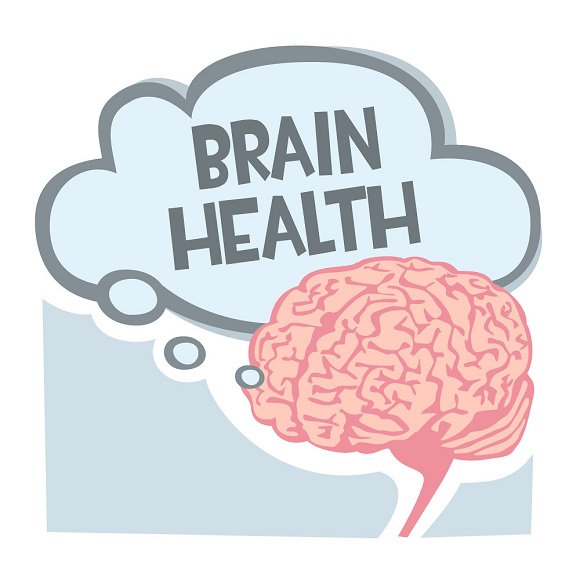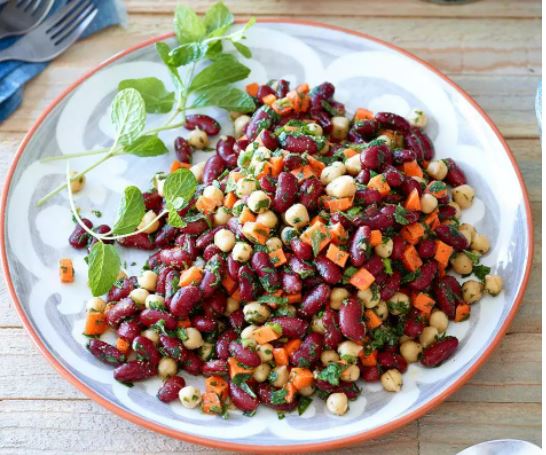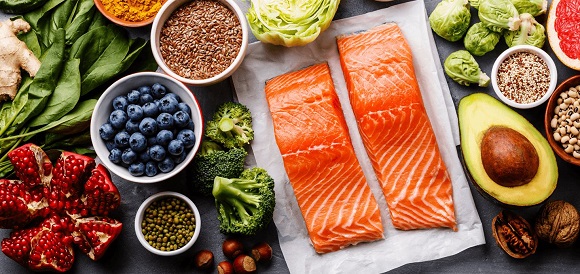In this edition
- How Can We Improve Brain Health?
- Brain Health Changes
- Beans are a great choice.
- Five Foods Linked to Better Brain Power
Healthy LIVING while aging!
This edition covers brain health and changes that occur while we age, and a delicious kidney bean and chickpea salad that would be great for a fresh summertime lunch or dinner entrée!
How Can We Improve Brain Health?
By Sarah Lenz Lock, Juris Doctor

Brain clip art with think cloud.
Science teaches us that people’s habits and lifestyles can affect their brain health for better or worse. Yet even when we know that healthy behaviors can reduce our risks for cognitive decline, we still cling to habits and behaviors that increase our risks as we age. But it does not have to be this way. That is why I’m so excited about a new report from the Global Council on Brain Health: “How to sustain brain health behaviors: applying lessons of public health and science to drive change.” The report outlines key strategies to help us live brain healthy lifestyles. Choosing these healthy habits can help us maintain our health and happiness and lower our risks for dementia. Healthy habits can also improve our quality of life if we do experience cognitive decline. We know what works. AARP, for example, recommends Six Pillars of Brain Health that are endorsed by experts around the world: social engagement, mental stimulation, stress management, exercise, eating right and adequate sleep. Studies also point to the health benefits of managing our blood pressure and blood sugar. Even while knowing, not enough people use this knowledge. Change is hard. Habits are tough to break. But this report shows that change is possible. The experts offer an assortment of tips and suggestions to help us achieve and sustain the behaviors needed for better brain health as we age.
Suggestions include:
- Setting specific goals that are realistic.
- Finding ways to make healthy behaviors enjoyable.
- Celebrating your wins.
- Approaching goals step by step.
- Building upon small successes that can be strengthened over time. After all, Rome wasn’t built in a day!
- Using some of your free time to participate in brain health building activities.
Let us all remember, the brain does not always go downhill as we age. Yes, our bodies change over time. However, we can take steps that may prevent, delay or minimize problems that may (or may not) arise. Committing to healthy lifestyles and habits keeps our brains and bodies as sharp as possible through the years. The Global Council on Brain Health's new report provides a much-needed roadmap to achieve this vision. For more information, visit: www.aarp.org/health/brain-health/ and click on the global council on brain health section. Interested in getting a little more help on how to build those healthy habits along the way? Check out AARP’s Staying Sharp Brain Health 101 challenge at: stayingsharp.aarp.org/challenges/. The Brain Health Challenge is a fun, guided interactive learning activity designed to help you learn about building healthy habits for brain health.
Sarah Lenz Lock is senior vice president for policy with AARP and leads the policy initiatives on brain health and care for people living with dementia. Sarah also serves on the Global Council on Brain Health.
Brain Health Changes

Two women smiling while being active.
Research suggests that the following steps are linked to brain health. Small changes may really add up. Making these a part of your routine could help you function better.
- Take Care of Your Physical Health
- Manage High Blood Pressure
- Eat Healthy Foods
- Be Physically Active
- Keep Your Mind Active
- Stay Connected with Social Activities
- Manage Stress
The National Institute on Aging has more information
Beans are a great choice.
Beans contain alpha-linolenic acid, considered essential because it is the only one of the three omega-3 fatty acids that your body cannot synthesize. Beans offer a great way to avoid the undesired fats, cholesterol and potential toxins frequently linked to other high-omega 3 foods — plus, they are loaded with fiber.
Kidney Bean and Chickpea Salad
The bold flavors of the lemon-cumin dressing in this healthy bean salad recipe make it a wonderful side dish to grilled beef or salmon. It’s also a star-spangled meatless main dish when served with rice, pasta or whole-wheat couscous. Couscous is a form of pasta available in your grocery store’s pasta aisle.

Kidney bean and chickpea salad.
Ingredients for Dressing:
- 1 small clove garlic, chopped
- 1 teaspoon kosher salt, divided
- 1 teaspoon olive oil
- ¼ cup lemon juice
- 2 tablespoons ground cumin
- ¼ teaspoon ground cinnamon
Ingredients for Salad:
- 2, 15-ounce cans dark red kidney beans, rinsed
- 1, 15-ounce can chickpeas, rinsed
- 1 cup carrot, finely diced
- 1 ½ cups fresh parsley, chopped
- ½ cup fresh mint, chopped
Directions: 1) Sprinkle garlic with ½ teaspoon salt and mash with the side of a knife or with a fork to form a paste. Scrape the paste into a large bowl. 2) Add the remaining ½ teaspoon salt, oil, lemon juice, cumin and cinnamon and whisk to combine. 3) Stir in kidney beans, chickpeas, carrot, parsley and mint. Serve at room temperature or cold.
For additional recipes
Five Foods Linked to Better Brain Power

Brain power foods: green veggies, salmon, and berries.
- Green Veggies
- Fatty Fish
- Berries
- Tea and coffee
- Walnuts
For more information on foods linked to better brainpower, check out the following link
Published by:
Lenz Lock, S., 2022, Healthy LIVING while aging! (2022-06), Extension, University of Nevada Reno, Newsletter, Volume 3, Issue 6
An EEO/AA Institution. Copyright ©
2026, University of Nevada Cooperative Extension.
A partnership of Nevada counties; University of Nevada, Reno; and the U.S. Department of Agriculture


